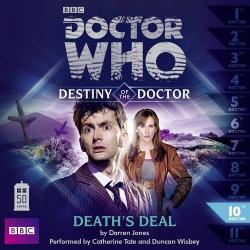Destiny of the Doctor: Death's Deal
Friday, 25 October 2013 - Reviewed by

Destiny of the Doctor: Death's Deal
Released by AudioGo
Produced by Big Finish
Written by Darren Jones
Directed by John Ainsworth
Released: October 2013
It’s only natural, as this momentous 50th Anniversary year races towards its triumphant climax, that fans’ hopes for the remaining releases destined to act as a spearhead for Doctor Who’s celebrations would be high, to say the least. Death’s Deal matches and surpasses these initial expectations with ease, its focus on one of the show’s most popular lead stars just one of several key assets which elevate it beyond many of the other entries in the Destiny of the Doctor range so far. The celebratory year in question may be nearing its end, but judging by this penultimate instalment, there’s plenty of life left in AudioGo’s Who offerings yet.
Most of all, it’s the return of Catherine Tate as both the piece’s narrator and the voice of the feisty and defiant Donna Noble that does this particular era of the programme proud. Tate accurately captures the voices of David Tennant’s Tenth Doctor, corrupt pirates, thrill-seeking tourists and plenty more visitors to the danger-laden planet of Death’s Deal, each construct possessing distinct qualities to separate from their cohorts thanks to her admirable vocal flexibility at the helm of proceedings. F. Scott Fitzgerald once described his Gatsby protagonist Nick Carraway as finding himself “simultaneously enchanted and repelled by the inexhaustible varieties of life”, and in this regard Tate (inadvertently) capably echoes the sense of enchantment or repulsion that a listener can simultaneously exhibit if a drama’s characters are presented so effectively as they are here.
Joining this month’s lead vocalist is Duncan Wisbey, taking on the roles of both the elusive Krux and the conflicted professor Erskine, the latter of whom may have further implications down the line if the Eleventh Doctor’s obligatory message to his predecessor is anything to go by. It’s a shame to admit that Wisbey’s contribution fails to attain the same level of dramatic prowess as that which Tate provides, perhaps due to the dialogue that writer Darren Jones affords his characters coming up short in comparison to that which he affords the likes of the Doctor and Donna. Whereas past secondary contributors to the range such as John Schwab, Evie Dawnay and Tam Williams have excelled with the content they’ve been offered by the various writers on hand, Wisbey’s dialogue often comes off as scarcely more than an after-thought, the necessity of a second cast member likely more of an irritating constraint than anything else for Jones in the course of drafting.
John Ainsworth’s direction, on the other hand, is nothing if not accomplished in every sense of the word. There’s a tangible sense of visual presence to the piece in spite of the nature of its medium, with the atmospheric soundtrack backing Tate’s narration offering up a sensory depiction of the drama’s setting in a more inspired manner than any of the previous Destiny releases. Not since Babblesphere in April has there been an instalment within this range which has exhibited quite so much assured confidence in its approach, be it thanks to its scribe, its central orator or its director, and with the ever-present knowledge of Who’s impending anniversary looming large on this particular release, to see it succeed with such unrestrained vigour is an enriching event for fans such at myself at this stage.
Matt Smith’s incarnation of the Doctor naturally gets his chance to place a mission before his tenth persona, albeit with his speech once again expressed through Tate rather than Smith himself. While the implementation of the current version of the Time Lord into the narrative doesn’t jar with its tone, in contrast to his appearances in Vengeance of the Stones, Smoke and Mirrors and Enemy Aliens, with only one episode remaining in the series, the lack of a greater development in the overall Destiny story arc is concerning. More than ever before, it seems that The Time Machine must resolve plot threads aplenty, while writer Matt Fitton simultaneously attempts to provide a standalone storyline for newcomers. Greater feats than this required balance have been achieved before in the show’s history, meaning that it’s not inconceivable that Fitton will succeed, yet there’s certainly an almighty challenge awaiting him next month thanks to the absence of any major narrative arc progression beforehand.
For now, though, there’s little need to focus too prominently on what Death’s Deal doesn’t offer its listeners in a wider context. In isolation, this is an exemplary addition to the Destiny range, Tate’s narration and Ainsworth’s direction both fine examples of what the most talented contributors to these releases have to offer. If this instalment and last month’s Night of the Whisper can be considered as setting a precedent for what’s to come from the studio in the remainder of 2013 and beyond, then the essential role which AudioGo can still play in expanding the Doctor Who universe has become crystal clear. There would be no greater injustice at this stage than for the studio to collapse under financial pressures. For in AudioGo’s survival could very well lie the show’s future. With their survival, the programme’s immortality can be assured, regardless of on-screen hiatuses or temporary cancellations, thanks to high-calibre releases such as these forever demonstrating the diverse range of layered adventures on which writers and actors can still take the world’s favourite Time Lord fifty years on.
The song of Destiny may be nearing its conclusion, but the story of the Doctor should never end…







